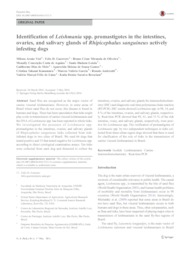Identification of Leishmania spp. promastigotes in the intestines, ovaries, and salivary glands of Rhipicephalus sanguineus actively infesting dogs.
Identification of Leishmania spp. promastigotes in the intestines, ovaries, and salivary glands of Rhipicephalus sanguineus actively infesting dogs.
Author(s): VIOL, M. A.; GUERRERO, F. D.; OLIVEIRA, B. C. M. de; AQUINO, M. C. C. de; LOIOLA, S. H.; MELO, G. D. de; GOMES, A. H. de S.; KANAMURA, C. T.; GARCIA, M. V.; ANDREOTTI, R.; LIMA, V. M. F. de; BRESCIANI, K. D. S.
Summary: Sand flies are recognized as the major vector of canine visceral leishmaniasis. However, in some areas of Brazil where sand flies do not occur, this disease is found in humans and dogs. There has been speculation that ticks might play a role in transmission of canine visceral leishmaniasis and the DNA of Leishmania spp. has been reported in whole ticks. We investigated the presence of Leishmania spp. promastigotes in the intestines, ovaries, and salivary glands of Rhipicephalus sanguineus ticks collected from tickinfested dogs in two cities of Brazil. We used 66 dogs that tested positive and 33 that tested negative for Leishmania spp. according to direct cytological examination assays. Ten ticks were collected from each dog and dissected to collect the intestines, ovaries, and salivary glands for immunohistochemistry (IHC) and diagnostic real-time polymerase chain reaction (RT-PCR). IHC results showed Leishmania spp. in 98, 14, and 8 % of the intestines, ovaries, and salivary glands, respectively. Real-time PCR showed that 89, 41, and 33 % of the tick intestine, ovary, and salivary glands, respectively, were positive for Leishmania spp. The verification of promastigotes of Leishmania spp. by two independent techniques in ticks collected from these urban region dogs showed that there is need for clarification of the role of ticks in the transmission of canine visceral leishmaniasis in Brazil.
Publication year: 2016
Types of publication: Journal article
Unit: Embrapa Beef Cattle
Observation
Some of Embrapa's publications are published as ePub files. To read them, use or download one of the following free software options to your computer or mobile device. Android: Google Play Books; IOS: iBooks; Windows and Linux: Calibre.
Access other publications
Access the Agricultural Research Database (BDPA) to consult Embrapa's full library collection and records.
Visit Embrapa Bookstore to purchase books and other publications sold by Embrapa.

